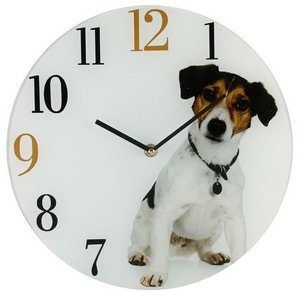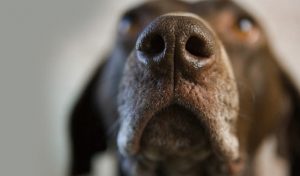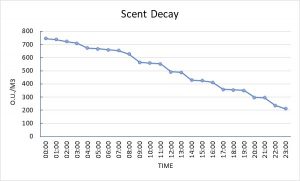
In previous articles we highlighted that pets in general, and dogs in specific, live in the moment – not the past or they certainly do not have a concept of the future. Therefore, dogs do not comprehend the concept of time, not do they recognize the passage of time as we human’s do.
Some people will argue that dogs do understand the concept of time and plan for the future and base the argument on the fact that dogs will dig and hide bones, so they can snack on it later. Unfortunately, this does not prove that dogs understand the future. They simply follow instinct which from thousands of years has been ingrained into their behavior – store food for the harsh season that will come and where food is scarce or non-existent. In fact, if dogs do understand the future and therefore hiding food is proof of that, then logic says that if the owner offers them a meal which they are not very fond of, they should decline consuming it and go dig-out the hidden bone. In reality, dogs will consume whatever food they can readily get and only resort to digging out hidden bones as a last resort (or if they are bored and cannot find anything to chew on). No research in animal and dog behavior has shown any signs that animals have a concept of the future.
Additionally, research proves that dogs do not understand the passage of time. To prove this, try leaving your dog for 15 minutes and you will be greeted with the same excitement and enthusiasm as you would expect if you left him for half a day or a full day. I have heard many people argue that their dog fully understands the passage of time and that their dog knows exactly what time their owner is due to come back home, and therefore this proves their dog must have a built-in clock!
Dogs learn by association, sometimes complex chains of associations. They hear the sound of a specific make/model of car and a moment later you are home, the wife starts making dinner and 20 minutes later your are home, you start getting ready to go out and a little while later you are gone …so on and so forth.

In a scientific study to understand the ability of dogs to know exactly what time their owners are due to come back, scientists embarked on several experiments that identified that a dog most likely relies on a concept referred to as “Scent Decay”. This scent decay means that dogs appear to be able to accurately identify the “amount” of a scent that is present at any specific moment in time and associate the return of their owner with a specific level of scent that is left in the air. Remember that a dog’s logic is based on “association” and does not follow human type logic.
In one specific experiment which involved a couple who swore that their dog knows to the minute when the husband is due back home, and where the dog at exactly 5:40 pm will run to the front door and sit facing it a few minutes before the husband’s car even approached the house, the following test was done.
The wife was asked around noon, to take a change of shirt to her husband’s place of work and return to the house with the previously worn shirt stored in a sealed plastic bag. The wife was then asked to keep the dog in the kitchen, proceed to the living room where the dog usually sleeps, take out the shirt form the plastic bag, wave it around the room, and finally leave it lying casually on the back of an armchair. The dog was then allowed to return to the living room where it quickly settled onto its cushioned mat and fell asleep.
At 5:35 that day the dog remained fast asleep and showed no sign of alertness or excitement … it acted normally as it would when alone on any other day. 5:40pm arrived and the dog showed no sign of alertness and certainly did not run to the front door. The husband was asked to return at 6pm, park the car around the corner to avoid the dog hearing it, and just walk into the house. Upon entering the house, the dog looked up from its sleeping place with a surprised look on its face and after a moment of shock, got up and ran to greet the husband.

What actually had happened, scientists explain, is that the bringing back of the previously worn shirt of the husband and leaving it in the living room, has replenished the amount of scent in the room and therefore when 5:40pm arrived the level of scent remaining in the room was still much higher than the level the dog associated with the return of their owner.
So how can we use this information to the benefit of our dogs and to enrich our relationships with them? well, certainly understanding the way dogs use their acute sense of smell is vital scientific knowledge which can be used when training dogs both for domestic purposes or for security, police, or military assignments. The acceptance of the fact that dogs do not see the passage of time the way we humans do, is important when we leave our dogs at home as we go to work or when we kennel them for longer periods of time.

Most humans who love dogs develop a “human guilt” feeling and begin to imagine that their dog or pet must be sulking at home (or at the kennel) and must be feeling depressed. This type of human guilt often leads people to act in ways that unintentionally cause more anxiety and stress to their loved pet.
When you leave your home in the morning the dog may experience a slight level of anxiety, but will quickly settle down and relax for the rest of the day until you return – that is of course if your pet has been properly trained to minimize separation anxiety, if not then we will discuss how to deal with separation anxiety in another article. The same applies when you send your dog to a kennel for boarding – the first couple of hours may be stressful to a dog as it adapts to the new environment and routine (remember dogs need consistent patterns and routines) even if they have been used to the boarding kennel from past visits. After a couple of hours your dog quickly adapts to the kennel environment and settles into the daily routine – all anxiety and stress disappears for the rest of their stay.
However, this new pattern which they are now comfortable with can be interrupted if the owner decides to come visit the dog at the kennel for a short while – the dog is naturally happy to see the owner, they will jump and lick and play, but the minute the owner leaves they will re-experience the anxiety and stress they had on first arrival at the kennel and will require again some time to re-settle down. Therefore, we suggest to dog owners to resist the human urge to visit their pets who are in boarding as it may very well cause the pet unnecessary spouts of anxiety and stress.
